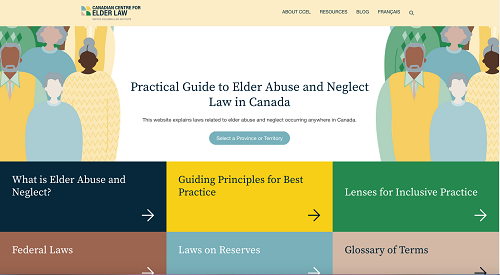The Canadian Centre for Elder Law (CCEL) has updated and re-published our Practical Guide to Elder Abuse and Neglect Law in Canada as a French-English bilingual website. This article will highlight key features of the Practical Guide.
- Modules on the Law in each Province and Territory
The website contains a module on relevant aspects of law and policy in each of the provinces and territories. The modules can be accessed from a drop down box on the landing page.
Each module covers:
- Adult protection legislation (if it exists in that jurisdiction)
- Remedies available under family violence legislation
- Rules and response requirements related to abuse occurring in long-term care
- Privacy law, confidentiality, solicitor-client privilege, and their impact on elder abuse response
- Abuse and neglect reporting responsibilities unique to specific professional groups
- Aspects of employment law, such as family violence leave provisions
Each module also summarizes the various financial substitute decision-makers in that province or territory, the powers and duties they have, and how to remove their authority if they appear to abusing an older person or their authority as substitute decision-maker.
The modules review critical aspects of policy, such as criminal prosecution policy and income assistance benefits available to older immigrants whose sponsors are abusing or neglecting them.
Each module identifies key contact agencies, such as where an older person can find legal help or victim assistance.
- Federal Legislation
The Practical Guide has a module on federal laws that apply to elder abuse. The section identifies Criminal Code of Canada offences that could apply to instances of abuse and neglect. The section also discusses family class immigration and sponsorship breakdown and federal privacy laws that apply to abuse and neglect response by federally regulated sectors, such as banks.
When older Indigenous people are living on reserves, the rights and options for response can be different. The Practical Guide contains a module on rights on reserves that addresses protection orders available under the Family Homes on Reserves and Matrimonial Interests or Rights Act, and some other law and policy issues linked to supporting older Indigenous people who have experienced abuse or neglect.

Please log in to read the full article.